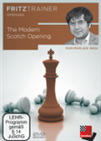No rest for ‘Nepo’
Interviewed after his victory over Anish Giri on Sunday, Ian Nepomniachtchi confessed, “I have no feelings, I’m just very tired”. The Russian grandmaster had a good performance throughout the semifinals, but failed to take advantage of some opportunities that could have ended the match more quickly.
Nepomniachtchi won the first set 2½:½ and saw Giri bouncing back twice in Saturday’s second set. The Dutchman later won the Armageddon decider and forced his opponent to come back for a third mini-match on Sunday. Four consecutive draws led to yet another blitz tiebreaker, with the Russian finally getting the pass to the final in game 6.
The complete opposite happened in the other semi, as Magnus Carlsen defeated Peter Svidler in straight sets, with each mini-match lasting three games — the equivalent to a 6:1 6:1 victory in tennis.
 Garry Kasparov's rise to the top was meteoric and at his very first attempt he managed to become World Champion, the youngest of all time. In over six hours of video, he gives a first hand account of crucial events from recent chess history, you can improve your chess understanding and enjoy explanations and comments from a unique and outstanding personality on and off the chess board.
Garry Kasparov's rise to the top was meteoric and at his very first attempt he managed to become World Champion, the youngest of all time. In over six hours of video, he gives a first hand account of crucial events from recent chess history, you can improve your chess understanding and enjoy explanations and comments from a unique and outstanding personality on and off the chess board.Although Carlsen is a heavy favourite, Garry Kasparov, who was a guest during the commentary webcast on Saturday, noted that Nepomniachtchi has a real chance of taking down the Norwegian. According to Kasparov, his compatriot’s style leads to the kind of wild positions in which even the world champion might blunder.

Click to enlarge
Nepomniachtchi 3½ : 2½ Giri
Perhaps the moment Nepomniachtchi lamented the most from the whole semifinal match was his decision to play 31.f3 in the Armageddon tiebreaker of the second set:
Black’s attack looks scary, but White’s knight and rook plus the fact that the bishop is pinned give Nepomniachtchi the better position. Moving the rook away from the knight with 31.Rc3 or 31.Rg6 were enough to keep the edge, while 31.f3 turns the tables in favour of Black. Giri continued 31...Nxg3 32.Nxg3 Qf4. White grabbed the bishop with 33.fxe4, but saw the h-pawn joining the attack with decisive effect — 33...h5.
34.Qd3 h4 35.exf5 Rf8 36.Qf3 hxg3+ 37.Qxg3 Rxf5 38.Qxf4 Rxf4 and Black is simply an exchange up in the endgame. Nepomniachtchi resigned four moves later.
The deciding third set was a hard-fought, tension-filled affair. Four draws in the rapid section led, for a second day in a row, to blitz tiebreakers. ‘Nepo’ played the Grünfeld with black first and, despite getting in some trouble in the early middlegame, created enough complications to hold the balance — and even force his opponent to look for a perpetual in the end.
Continuing with the trend of creating complex struggles, the Russian played the Scotch in the second blitz game of the day:
 In this DVD, Parimarjan Negi looks at the latest revolution in Scotch theory that has completely changed white’s plans, and once again brought back the interest of the world’s elite.
In this DVD, Parimarjan Negi looks at the latest revolution in Scotch theory that has completely changed white’s plans, and once again brought back the interest of the world’s elite.
Giri ignored the threat of a fork on c5 with 17...fxe5, well aware of the fact that he would be able to recover the material. However, it turned out that the tactical sequence that followed left White with a favourable endgame — 18.Nc5 Qf5 19.Nxa6 exf4 20.Qd3 Bxb2+ 21.Kxb2 Qe5+ 22.Qc3 Kb7 23.Qxe5 Rxe5 24.Rxh6.
24...c5 25.Nxc5 Rxc5 25.Rxh7 Rf8 26.Be2 d6 — advancing to d6 was a blunder by Giri, as his opponent could have simply captured the pawn due to the pin along the seventh rank. ‘Nepo’ missed this chance and played 27.Bf3. His position was still clearly favourable though, and this time around he managed to keep his cool and convert it into a win.
Carlsen 2½ : ½ Svidler
The world champion won games 1 and 2 of the second set, after having eased to victory in the first set. First, he punished Svidler’s bold decision to castle queenside with black in a Sicilian:
 Dutch Grandmaster Roeland Pruijssers and International Master Nico Zwirs created a complete repertoire against the Sicilian that is based on the Open Sicilian and that is easy to learn. They show patterns you should know when playing the Open Sicilian
Dutch Grandmaster Roeland Pruijssers and International Master Nico Zwirs created a complete repertoire against the Sicilian that is based on the Open Sicilian and that is easy to learn. They show patterns you should know when playing the Open Sicilian
14...0-0-0 pretty much invites White to create threats on the queenside with his better-developed army. Carlsen was ruthless and won the game in 26 moves.
Another tactical oversight by the Russian, this time in an endgame, gave Carlsen a second win in a row:
White’s 28.Rf2 allowed 28...Nd1 when, strangely, there’s no way to save the exchange — for example, after 29.Rfc2 Re1+ 30.Kg2 Ne3+ forks bishop and rook. Svidler opted for 31.Bb3, but resigned shortly after 31...Nxf2 32.Kxf2 appeared on the board.
Links
























